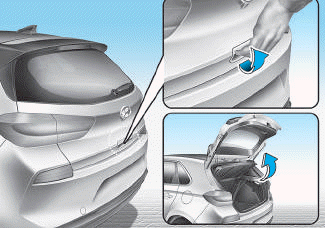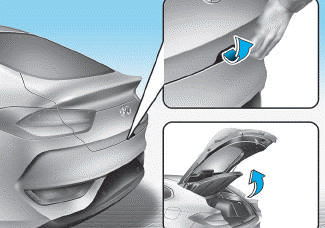Hyundai i-30: Air Conditioning System / Evaporator Temperature Sensor
Hyundai i30 (PD) 2018-2025 Service Manual / Heating, Ventilation and Air Conditioning / Air Conditioning System / Evaporator Temperature Sensor
Description and operation
| Description |
The evaporator temperature sensor will detect the evaporator core temperature
and interrupt compressor relay power in order to prevent evaporator from freezing
by excessive cooling. The evaporator temperature sensor has the Negative Temperature
Coefficient (NTC). Electrical resistivity of NTC will increase with decreasing
temperature and decrease with increasing temperature.
Repair procedures
| Inspection |
| 1. |
Turn the ignition switch OFF.
|
| 2. |
Disconnect the evaporator temperature sensor connector.
|
| 3. |
Measure the resistance between terminal "+" and "-" of the evaporator
temperature sensor.
Specification
|
| Diagnosis With GDS |
| 1. |
The heating, ventilation and air conditioning can be quickly diagnosed
failed parts with vehicle diagnostic system (GDS).
※ The diagnostic system (GDS) provides the following information.
(1) Self diagnosis : Checking the failure code (DTC) and display.
(2) Current data : Checking the system input/output data state.
(3) Actuation test : Checking the system operation condition.
(4) Additional function : Other controlling such as he system option
and zero point adjustment.
|
| 2. |
Select the 'Car model' and the system to be checked in order to check
the vehicle with the tester.
|
| 3. |
Select the 'Current data' menu to search the current state of the input
/ output data.
The input / output data for the sensors corresponding to the Evaporator
Temperature Sensor can be checked.
|
| Replacement |
| 1. |
Disconnect the negative (-) battery terminal.
|
| 2. |
Remove the heater and blower unit from the crash pad after loosening
the mounting nuts.
(Refer to Heater - "Heater Unit")
|
| 3. |
Remove the evaporator core cover (A) after loosening the mounting screws.
|
| 4. |
Pull out the evaporator core (A) from the heater unit.
|
| 5. |
Remove the evaporator temperature sensor (A) from the evaporator core.
|
| 6. |
To install, reverse the removal procedure.
|
 A/C Pressure Transducer
A/C Pressure Transducer
Description and operation
Description
The A/C Pressure Transducer (APT) converts the pressure value of high pressure
line into voltage value after measuring it...
 In-car Sensor
In-car Sensor
Description and operation
Description
The In-car air temperature sensor is built in the heater & A/C control unit.
The sensor contains a thermistor which measures the temperature of the inside...
Other information:
Hyundai i30 (PD) 2018-2025 Owner's Manual: Interior overview
1. Inside door handle 2. Driver position memory system 3. Outside rearview mirror folding 4. Outside rearview mirror control 5. Power window lock switch 6. Power window switches 7. Headlight levelling device 8. Instrument panel illumination control switch 9...
Hyundai i30 (PD) 2018-2025 Owner's Manual: Front air ventilation seat
The air ventilation seats are provided to cool the front seats by blowing air through small vent holes on the surface of the seat cushions and seatbacks. When the operation of the air ventilation seat is not needed, keep the switches in the OFF position...
Categories
- Manuals Home
- 3rd Generation i30 Owners Manual
- 3rd Generation i30 Service Manual
- Exhaust System (DPF) Warning Light. Glow Indicator Light
- Front windscreen wiper service position
- Engine coolant
- New on site
- Most important about car
Tailgate
Opening the tailgate

■ 5 Door, Wagon

■ Fastback
Copyright © 2025 www.hi30.net






